US election 2016: Five things to watch in results
- Published
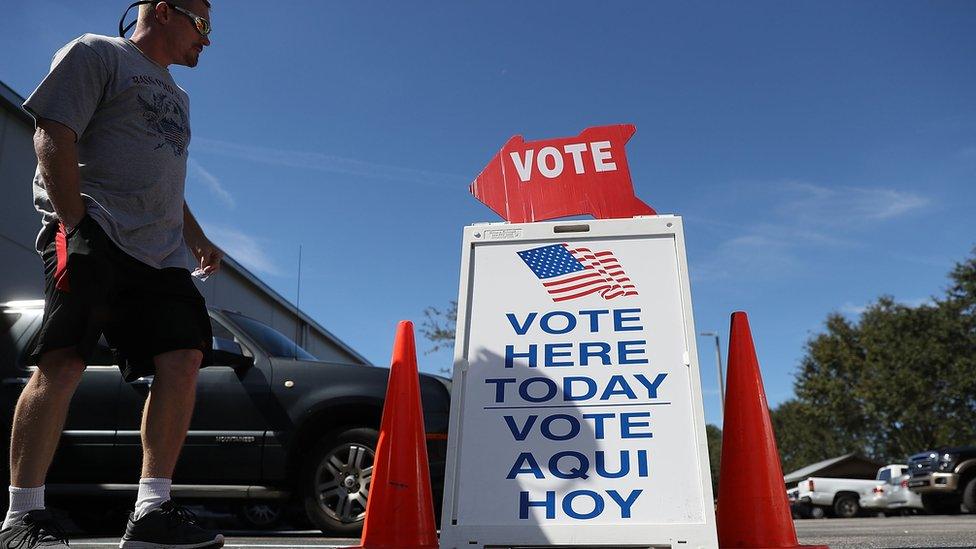
At this point, most people know the big electoral prizes at stake on Tuesday night.
Florida, Ohio and Pennsylvania are going to attract the lion's share of attention, as they have in the past few elections - and their disposition certainly will be pivotal in determining the identity of the next US president.
Those three states won't tell the whole story, however.
As you sit down with your popcorn, or prepare to chew your nails to the quick, here are some other things to look for as the night progresses.

1. V for Virginia
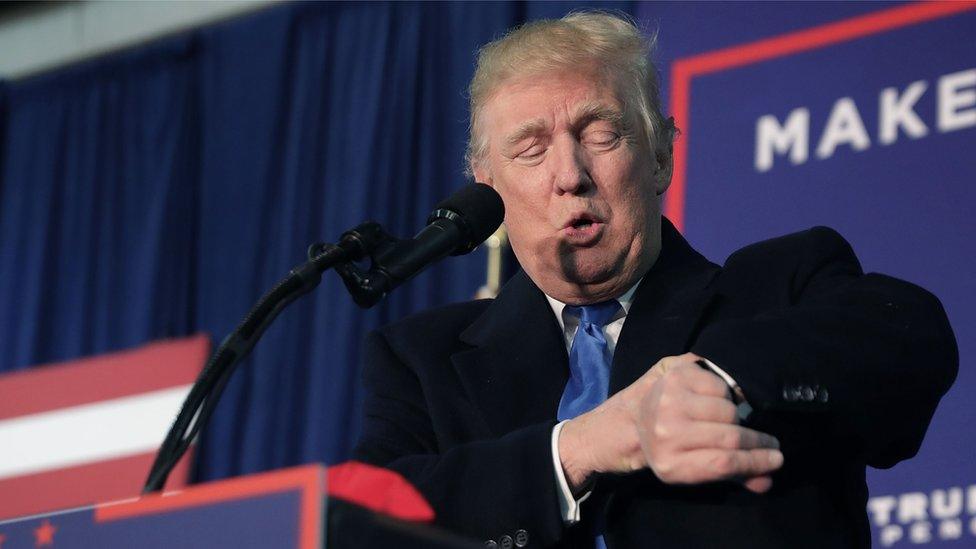
Donald Trump holds a midnight rally in Virginia
The starting gun for election night sounds at 19:00 EST (00:00 GMT), and while some may be wondering if Mrs Clinton can pull off an upset win in Georgia, a more important test will happen in Virginia.
If Donald Trump wants to claim the presidency, he either must sweep all the toss-up states on the board or win someplace unexpected. A victory in Virginia would certainly qualify as the latter.
The Old Dominion State is a key piece of Mrs Clinton's vaunted "blue firewall" - the group of states the Democratic candidate expects to keep in her party's colours. If she shows signs of trouble there, it could indicate that polling is off or an unexpected Trump wave is getting ready to break across the nation.
A Virginia surprise certainly wouldn't be unprecedented. In the 2014 mid-term elections, polls suggested that popular incumbent Democratic Senator Mark Warner was going to cruise to victory. Instead, he edged out woefully outspent former Republican Ed Gillespie by a mere 0.8%.
Polls have shown the race in Virginia tightening - and the two campaigns have clearly taken note. Mr Trump was there on Sunday night. Senator Tim Kaine, who Mrs Clinton picked as a running mate in part to assure that Virginia stays blue, made two get-out-the-vote appearances in his home state on Monday.
A Trump win in Virginia would put Mrs Clinton on the ropes early. And even if it's just close, that could portend a very long, stressful night for the Democrats.

2. Thank you, New Hampshire
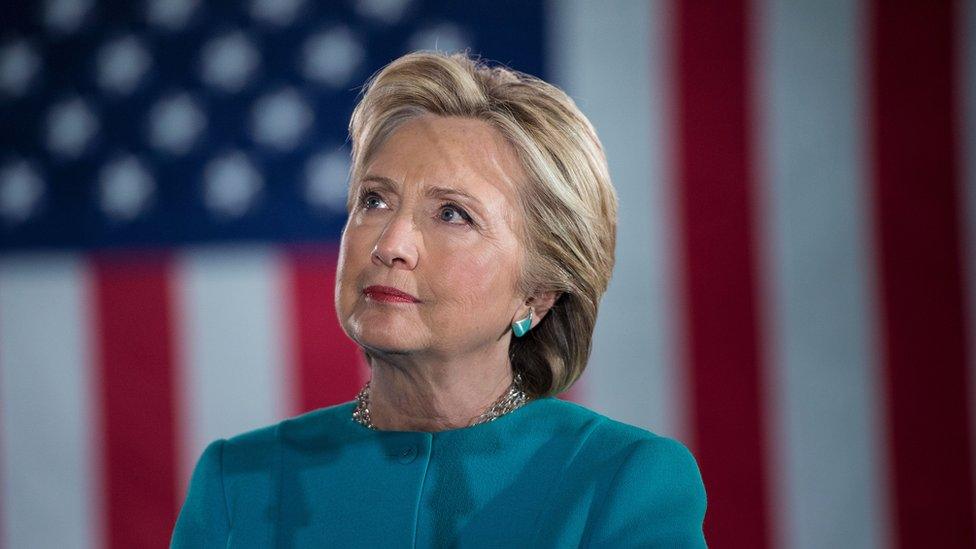
New Hampshire's Democrats voted for Hillary Clinton's rival in the primaries
In his 1989 inaugural address, President George HW Bush famously gave credit to New Hampshire for sparking his political comeback. If Mr Trump succeeds in sweeping 2016's toss-up states, he may owe a debt to the Granite State as well.
Up until about a week ago, the state had been leaning Democratic. Now several polls show the contest a dead heat. It is still likely to be one of the most treacherous portions of Mr Trump's clearest path to 270 electoral votes, however.
New Hampshire's electorate is well-educated and among the wealthiest in the US. Its economy is humming along, with unemployment below 3% - not the most natural audience for Mr Trump's populist, doom-and-gloom rhetoric.

US election: The essentials

New Hampshire voters have a strong independent streak, however, and are traditionally more conservative than residents of neighbouring New England states. While Mr Trump's economic message may largely fall on deaf ears, his anti-establishment pitch has clearly resonated.
The state is also full of the kind of young, idealistic voters who gave Vermont's Bernie Sanders a resounding win over Mrs Clinton in the February Democratic primary. If they stay home, or vote for a third-party candidate like the Green Party's Jill Stein, it could open the door for the Republicans.
Polls there close at 20:00 EST (01:00 GMT on Wednesday), and it's a small state, so while results from Pennsylvania and Florida will dribble in at the same time, New Hampshire's fate should be apparent fairly quickly.

3. Exits right or left?
As polls close across the East Coast, we should get an increasingly accurate picture of the 2016 US electorate. And even before many states are declared won or lost, it will likely be fairly clear which side is going to have the upper hand.
Thanks to exit polls, we'll know whether evidence of higher-than-expected Hispanic turnout in places like Florida, Georgia and North Carolina is enough to have an electoral impact. We'll also know if blacks, who voted at a higher percentage of their population than whites in 2008 and 2012, have stayed home in significant numbers without Barack Obama on the Democratic ticket.
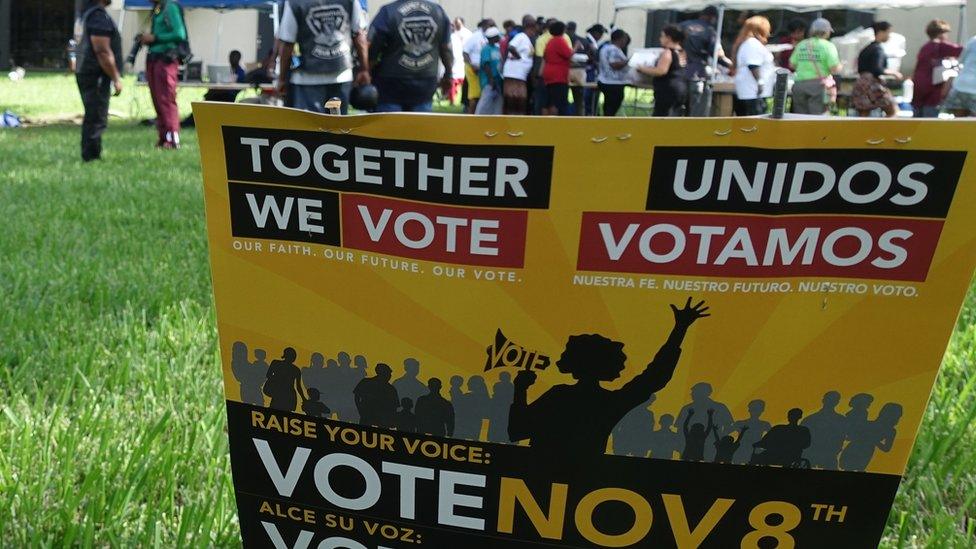
Will Hispanic voters turn out in sufficient numbers to influence the result?
In places like Michigan, Wisconsin and Ohio white voters have exceeded past participation rates in early and absentee voting. Will that trend hold on election day? If so, it could be a sign that the industrial "rust belt" states are trending toward Mr Trump.
Finally, Mrs Clinton's position as the first woman major party nominee and Mr Trump's record of misogynistic comments and allegations of sexual improprieties could combine to create the largest electoral gender gap since women won the right to the vote less than 100 years ago.
Of particular interest will be whether married white women - usually a right-leaning demographic - have balked at backing the Republican nominee. If that's the case, it could offset whatever advances Mr Trump makes with working-class whites who in the past have supported Democrats in states like Pennsylvania.

4. How the West is won
Suppose Mr Trump wins New Hampshire and the other eastern battleground states. Or maybe he makes inroads in the Midwest that offset losses in Florida or North Carolina. If such a scenario unfolds, Americans could be in for a very long night, as all eyes turn west.
Nevada, which usually trends Democratic, and Arizona, which has historically been a conservative redoubt, are both in play in 2016. Their desert-dwelling residents could hold the future of the nation in their hands in Tuesday's waning hours.
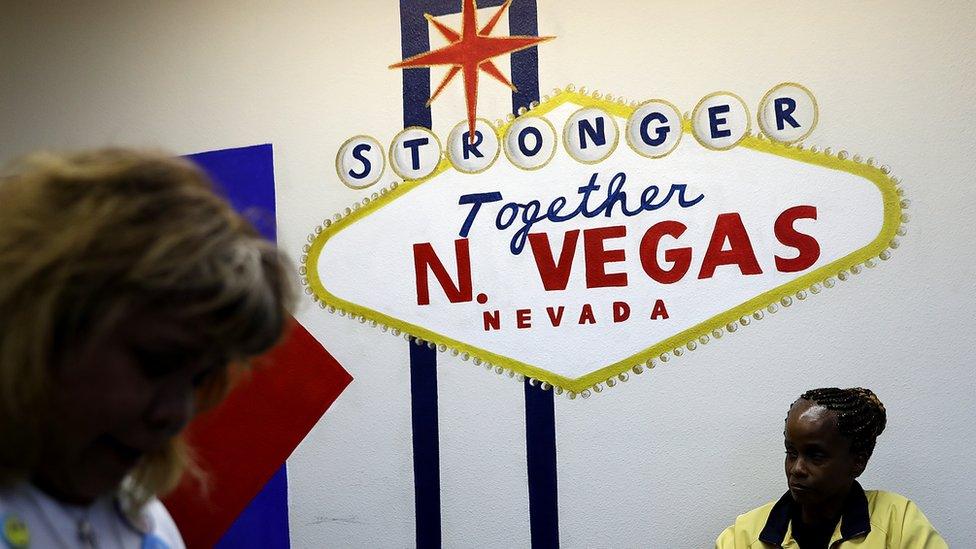
The Clinton campaign has high hopes for Nevada
While polls have showed Mr Trump either tied or with a slight lead in Nevada, early voting results have indicated massive turnout in the liberal areas around Las Vegas. According to the state's veteran political analyst Jon Ralston, external, Democrats have banked a 70,000 vote lead heading into election day, built largely on the back of larger-than-expected turnout in Hispanic precincts.
Mr Trump's hope is that election day support in rural, conservative regions whittles that margin down to nothing - but it's a high mountain to climb.
The Clinton camp made a strong push for Arizona after polls showed her with a slight lead there. Both Mrs Clinton and Mr Kaine made recent appearances, and the campaign has spent more than $2m in advertising.
As with Nevada, Hispanic turnout in Arizona is up markedly, although recent polls have shown Mr Trump pulling back ahead. Some have questioned whether the Clinton campaign's efforts there have been time well spent, given signs of weakness in places like Ohio - but a win there, coupled by holding Nevada, could prove to be an alternate firewall built from Hispanic support that protects against a mid-western Trump surge.
The Republican nominee fuelled his primary campaign with sharp criticisms of Mexico and the millions of its undocumented migrants that currently live in the US. While it has gotten him this far, it could prove to be his general election undoing.

5. Down-ballot drama
While the results of the presidential race unfold on Tuesday night, control of the US Senate will also hang in the balance - and the fate of that chamber is nearly as important as who wins the White House.
Right now Republicans hold a three-seat lead in the 100-person chamber, but they have more at-risk incumbents on the ballot in 2016. (Every seat in the House of Representatives is also up for election, but thanks to demographics and the way district lines have been drawn by many conservative state legislatures, it will likely stay in Republican hands.)
If Mrs Clinton is elected, she will need a Democratic Senate to help seat her executive and judicial nominees, including filling the open spot on the US Supreme Court. Meanwhile, control of both houses of Congress would give Mr Trump a clear avenue for advancing a Republican agenda that has been stymied by eight years of Democratic control of the White House.
Historically, the presidential winner has "coattails" that carry down-ballot candidates to victory as well. This, it is safe to say, isn't the typical election. Republican Senate candidates have been outperforming Mr Trump in polls across the nation, and they could end up winning even if their party's presidential nominee goes down to a narrow defeat.
Many of the presidential swing states also have closely contested Senate races. Keep an eye on embattled Republican incumbents in New Hampshire, Pennsylvania, North Carolina and Missouri, and open seats in Nevada and Indiana.
Former presidential hopeful Marco Rubio, once a rising star in Republican politics, is fighting for re-election in Florida, and Democrats would love nothing more than to knock him out of elected office.
In two years, the Democrats will have to defend many more vulnerable Senate seats, so they need to make their move now or they will be looking at a long stretch of minority status in Congress.
And if Mr Trump and the Republicans sweep? The Democrats will face the darkest of days, with little hope for a immediate rebound and few leaders in a position to take up the fight.